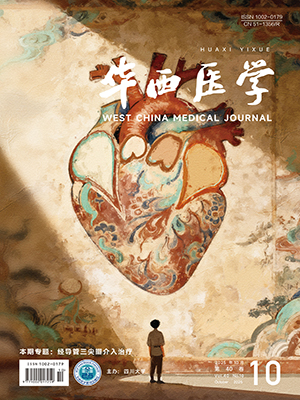| 1. |
中华医学会重症医学分会.中国严重脓毒症/脓毒性休克治疗指南(2014)[J].中华危重病急救医学, 2015, 27(6): 401-426.
|
| 2. |
Balk RA. Severe sepsis and septic shock. Definitions, epidemiology, and clinical manifestations[J]. Crit Care Clin, 2000, 16(2): 179-192.
|
| 3. |
Shankar-Hari S, Manu, Phillips, et al. Developing a new definition and assessing new clinical criteria for septic shock, for the third international consensus definitions for sepsis and septic shock (sepsis-3)[J]. JAMA, 2016, 315(8): 775-787.
|
| 4. |
董磊, 张辉.脓毒性休克的临床流行病学调查: 1087例全国多中心临床研究[J].中国临床医学, 2010, 17(3): 436-438.
|
| 5. |
黄顺伟.四种评分系统对重症脓毒症病人动态评分的比较[J].中国急救医学, 2005, 25(11): 802-803.
|
| 6. |
朱学云, 魏桃英. C反应蛋白和急性生理学与慢性健康状况评分系统Ⅱ在感染性休克中的临床意义[J].中国危重病急救医学, 2006, 18(9): 564.
|
| 7. |
Beck DH, Taylor BL, Millar B, et al. Prediction of outcome from intensive care: a prospective cohort study comparing Acute Physiology and Chronic Health Evaluation Ⅱ and Ⅲ prognostic systems in a United Kingdom intensive care unit[J]. Crit Care Med, 1997, 25(1): 9-15.
|
| 8. |
刘旭, 吕隽, 李文强, 等.急诊脓毒症病死率评分在急诊脓毒症休克患者中的应用研究[J].医学临床研究, 2016, 33(2): 216-220.
|
| 9. |
VincentJL, MorenoR, TakalaJ, et al. The SOFA (sepsis-related organ failure assessment) score to describle organ dysfunction/failure[J]. Intensive Care Med, 1996, 22(7): 707-710.
|
| 10. |
Vincent JL, De M. Use of the SOFA score to assess the incidence of organ dysfunction/failure in intensive care units: results of a multicenter, prospective study[J]. Crit Care Med, 1998, 26(11): 1793-1800.
|
| 11. |
Mereno R, Vincent JL. The use of maximum SOFA score to quantify organ dysfunction/failure in intensive care. Results of a prospective, multicentre study[J]. Intensive Care Med, 1999, 25(7): 686-696.
|
| 12. |
Seymour CW, Liu VX, Iwashyna TJ, et al. Assessment of clinical criteria for sepsis: for the third international consensus definitions for sepsis and septic shock (sepsis-3)[J]. JAMA, 2016, 315(8): 762-774.
|
| 13. |
Levy MM, Fink MP, Marshall JC, et al. 2001 SCCM/ESICM/ACCP/ATS/SIS International sepsis difinitions conference[J]. Crit Care Med, 2003, 31(4): 1250-1256.
|
| 14. |
顾永辉, 卞叶萍, 林兆奋. APACHE Ⅱ, SOFA评分及降钙素原水平对脓毒症严重程度及预后的评估价值[J].医学与哲学, 2015, 36(12B): 35-37.
|
| 15. |
Knaus WA, Draper EA, Wagner DP, et al. APACHE Ⅱ: a severity of disease classification system[J]. Crit Care Med, 1985, 13(10):818-829.
|
| 16. |
Opal SM, Girard TD, Ely EW. The immunopathogenesis of sepsis in elderly patients[J]. Clin Infect Dis, 2005, 41(Suppl 7): S504-S512.
|
| 17. |
Martin GS, Mannino DM, Moss M. The effect of age on the development and outcome of adult sepsis[J]. Crit Care Med, 2006, 34(1): 15-21.
|
| 18. |
廖谷清.探讨老年脓毒症患者晚期免疫失衡的特点[J].南华大学学报:医学版, 2010, 38(1): 109-111.
|
| 19. |
张振辉, 熊旭明. ICU老年脓毒症患者危险因素分析[J].广东医学, 2009, 30(5): 769-771.
|
| 20. |
Baffert F, Le T, Thurston G, et al. Angiopoietin-1 decreases plasma leakage by reducing number and size of endothelial gaps in venules[J]. Am J Physiol Heart Circ Physiol, 2006, 290(1): H107-H118.
|
| 21. |
Bernard GR, Artigas A, Brigham KL, et al. The American-European consensus conference on ARDS. definitions, mechanisms, relevant outcomes, and clinical trial coordination[J]. Am J Respir Crit Care Med, 1994, 149(3 Pt 1): 818-824.
|
| 22. |
蔡国龙, 童洪杰, 郝雪景, 等.早期目标导向治疗对严重脓毒症/脓毒性休克患者病死率的影响:系统文献回顾与Meta分析[J].中华危重病急救医学, 2015(6): 439-442.
|




